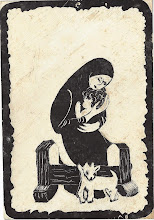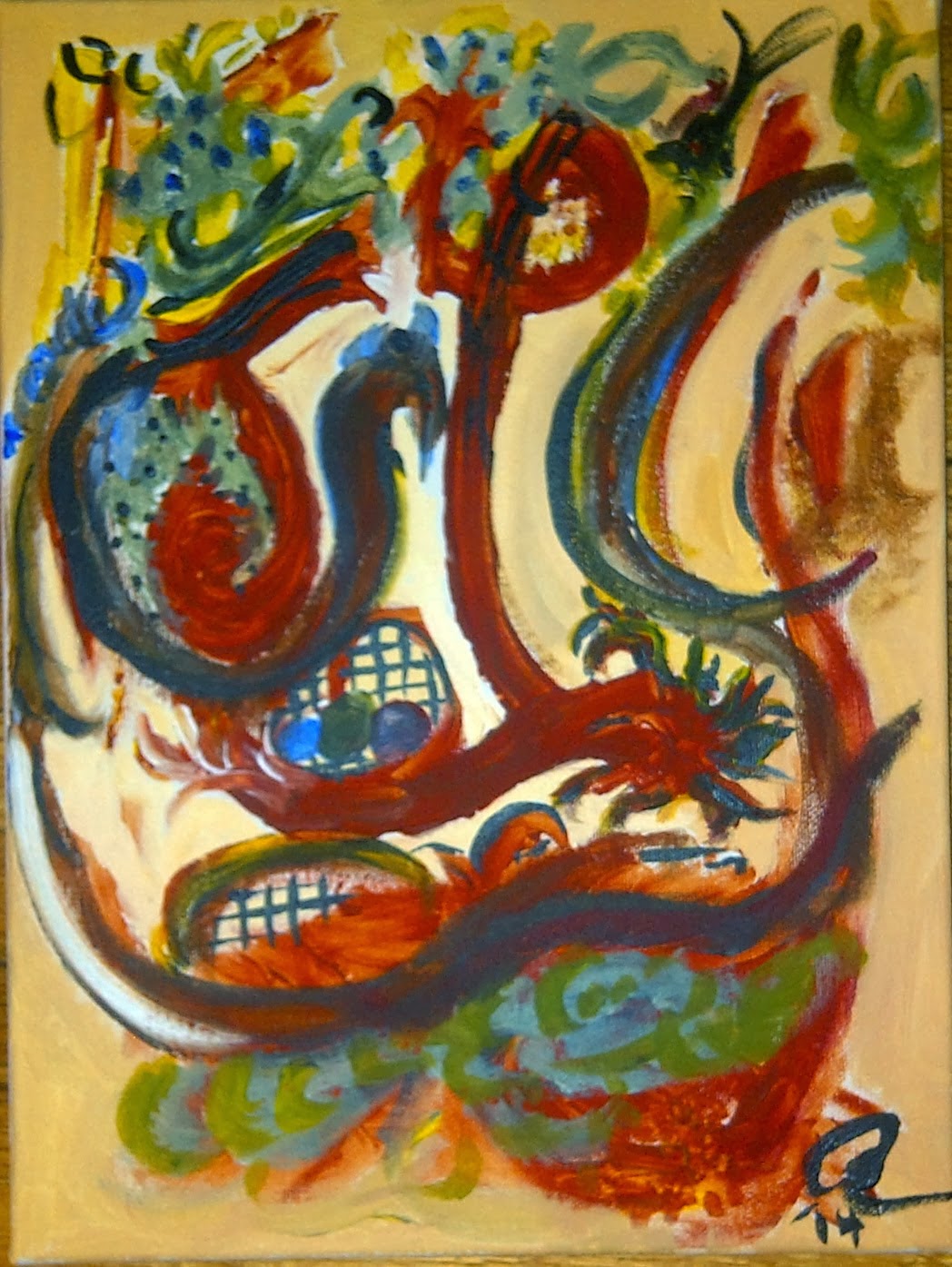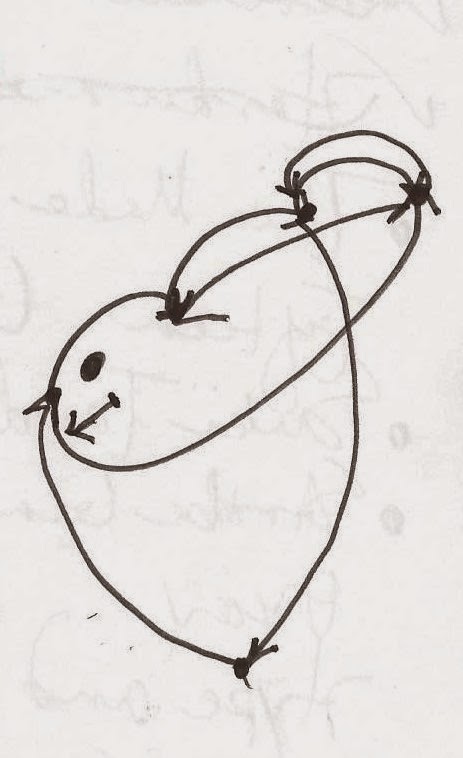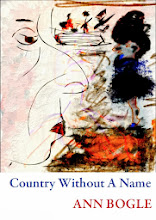Saturday, November 06, 2010
Friday, November 05, 2010
These hats are for sale!
Monday, August 09, 2010
Solzhenitsyn Jukebox, Argotist Ebooks, 2010

Solzhenitsyn Jukebox by Ann Bogle with cover art by Rachel Lisi, edited by Jeffrey Side, Argotist Ebooks, July 27, 2010.
Monday, July 05, 2010
Tuesday, June 29, 2010
Saturday, June 05, 2010
She lets her intentions guide her
Evelyn is 42. I listen as she explains that her “heart goes out to her”—to the woman whose husband she's stealing; there's no credit in that, I say, maybe in heaven. I listen as if to a speech by Obama. She could get a job that way, but I know she's afraid to be hired. She relies on our mother and calls her arts and crafts minor.
A friend of Evelyn's has canceled plans for the evening, and I am her fall back. We sip the beer I brought. I look at the flowering pots she's seeded on the balcony. She says she's glad she grew up in a liberal faith.
The handsome French husband's slender American wife lives with the two boys in a Victorian house across town. He calls it a marriage for Immigration. He takes Evelyn rock climbing. I take up his side when I hear he's romantic.
The American wife and Evelyn know people in common who send Evelyn angry messages. They're angry because they thought they knew her. They are New Age. Hell is unsketched in the notebook of New Age people. “There's a balance in heaven for mistresses,” I say, thinking “mistress” could be a pride word, but Evelyn admits to no name, only to love for the neighbors. “Is he your neighbor's husband?” I ask, inviting her to explain whether neighbor applies to women who covet—“deliriously desire”—husbands from Angers.
Labels:
CoE,
draft,
Fictionaut,
flash fiction,
story collection
Wednesday, June 02, 2010
Ledger
"Fiancée" at Istanbul Literary Review, May 2010.
"Tinges of Envy or How You Learn" at Metazen with "Metaview no. 1," Frank Hinton and Julie Innis, eds., May 25, 2010.
"Raisins" at Metazen with "Metaview no. 2," Frank Hinton and Julie Innis, eds., June 17, 2010.
"at 'night' any night is can't": Scalapino's Autobiography at Chant de la Sirene, Laura Hinton, ed., June 2, 2010.
"Tinges of Envy or How You Learn" at Metazen with "Metaview no. 1," Frank Hinton and Julie Innis, eds., May 25, 2010.
"Raisins" at Metazen with "Metaview no. 2," Frank Hinton and Julie Innis, eds., June 17, 2010.
"at 'night' any night is can't": Scalapino's Autobiography at Chant de la Sirene, Laura Hinton, ed., June 2, 2010.
Wednesday, May 05, 2010
Brock & Cheryl: Comp
A short story written collaboratively in early 2001 by mIEKAL aND and Ann Bogle and shared at Wryting-L listserv in 2005.
He is about six-foot-seven; he has brown, medium-length hair (crooked sort of, to the bottom of his ears); he wears a big suit that he probably got at a tall men's store. And the pants and coat match, into pin stripes (not a pin-stripe suit but a navy/gray line pattern). And his briefcase has insurance policies in it because that is what he sells. He got her name from an old boyfriend, but she doesn't know that or which one, and she thinks she needs more insurance, something she thinks of as another thing she must buy. The kind of insurance isn't clear to her — fire, theft, renter's, flood, other acts of God, what does he usually sell? He opens the briefcase.
He remembers someone long forgotten from high school. Everyone called her Tippy, but he always thought of her as Excess — a sublime popularity in his head: someone he took home at night, in his thoughts. Tippy or Excess, so many insurance policies later, was at the heart of his successful salesmanship, the One he never had but substituted in her absence with a readymade fiction of conquest and spooning.
Tippy, his fantasy mistress from high school, had actually gotten married two or three times, he heard later, but in high school, the fantasy was first, that she might be big enough for him — a stroke of luck there — but also he imagined himself married to a little woman who received his seed by caesarian. And Tippy, no one he would really take home, would climb in and out of the tool shed window — how he'd always imagined it. Brock has an insurance policy for this new version of Tippy Excess sitting before him, stupid, clueless, and hungry. Her pink-colored lips stuck in agape.
Let's make it clear that a policy is not a contract. Fantasies harbored for lifetimes attain a self-imposed rigor, a sentencing to a strict line drawn by the will. He could have slipped Tippy notes, but then there was the chance that Bogus, the football guy and her true possessor, would find him out. So in a makeshift flight of fancy he composed a marriage contract over and over in his head, only to surface later as the fine print of those damned policies.
This Tippy's name was Cheryl — something both of them were so far not committing to paper or saying. Unusual in a salesman, she thought. He is insincere and intends to sell her something. Best would be if he sold her the need for it, but that was beyond his intelligence to do, she decided. Skip need straight to conclusion. She was thinking about the chicken for the broiler pan. Buy insurance; keep up the regular home cooking because the time to prepare to meet a regular guy and settle down had come, again.
“I think of myself as sassy,” she once told a girl who shared a locker next to her. Having said that she was never free to become; the unprompted words were self-determined. Looking in the mirror every hair had its place. Morning required her complete attention to construct herself in an image that The Man of Dreams would be ready to float off on life's raft with. Something was burning in the oven, and a child would be crying with hunger and impatience. How fast Cheryl — Sassy ol' face, girl-runner-jumper-other, funny light — Cheryl got to the out: As soon as she could think of someone who might be coming to meet her. She would think of the loss, of it becoming a life for someone not Sassy, pale Cheryl, good Cheryl, Cheryl too right for the bank, Cheryl righter than the bank, of the kid, the cooking, the forgetting to look in the mirror, the man — it could be Brock Insurance Salesman — out scouting his next Sassy, but mostly, she thought of staying at home without her next Someone Coming Up, the guy out the corner of her eye, just next to her day, coming up, to unlock Sassy and leave a baby girl crying.
9 a.m.: Brock picks up the phone and leaves a message.
10 a.m.: Cheryl checks her messages, something about an expired “policy.”
11 a.m.: This is the day that the mail is not delivered (a bank holiday), so Cheryl heads for the Post Office.
12:15 p.m.: Cheryl discovers a letter from many years ago crammed into her postal box. Shreds of poems and clippings from a yearbook but no return address. She hastily looks around the mailbox room to be sure that no one is watching and puts the envelope in her purse. Out the door.
12:20 p.m.: Brock is standing in the street kicking a tire in the hopes his car will start up.
The good thing is the blue, bark, back thing never reversed, never reversed. Traversed is Professional Cheryl, not a walker, a lady getting her mail before a date with the too-tall Brock. Brock is thinking of his car. No lady getting her mail can save the car, more important in the scheme of who-he-is-today: Nissan — than who he will be tonight after he smokes her. He can see her yeah/no walk as he kicks the tire one more time, in time for her to see it, squarely, but what if she's got her hand on his too-tall ass the entire mile, an eternity? No, the car is temporarily disabled. He does have time for a hand on the ass, but where does it come from and in the end will his car start? All these questions are the province of the third party ambiguous, someone who claims to be an accomplice to the Author, but not a loyal Reader, or a Scanner. The car was Brock's pride before the wheel wells started rusting out. His buttocks tightened as he swiveled to have a look-see.
It was another Jesus-Short, something in the circuitry between car-man-song, no wise, again (his buttocks itching for the real touch not about to come from a Jesus reaches from Cheryl past him). He hadn't decided about Jesus, the real Jesus from the morning of his life, about his past, her past, except to look forward to the real touch or face or past means Cheryl's past was (Cheryl no one's wife, he guessed) a streak of indiscretions. Cheryl thinks of his tall ass first, the car second, and of his two secrets last. She can guess at his secrets. There is no hold, no Nissan — she tells him the car will be fixed or he'll get a new one, must be God sending him a message. With this guy she has to take even a minute of her two-minute approach to mention God and cars as if they were synchronously connected. Last time she thought of Jesus she was looking at him, dark Aramaic, long-haired, just her type, and it seemed profane to her. No, she wasn't a churchy girl, but she belonged to the couch of believers who invited the banal to constitute her religiosity, not hail Marys but some man in imitation of a god implanted in her male universe. The men of tomorrow lined up in a row, unchoosable but nonetheless viewable. Brock only knew how to wink in acknowledgement. This was the one. He had her picture in his glove compartment, more than one, the others in the photos darkened.
“Your car,” Cheryl pried.
“Gas,” Brock mentioned. He was more than a bucket nervous.
“1982?” She remembered him. “Stairway to Heaven.” That song played in his car, in his home, at work. “Economics class?” She had never had much of a mind for indecent global numbers.
~mIEKAL aND & Ann Bogle
Labels:
CoE,
collaboration,
draft,
Fictionaut,
short story,
story collection
Thursday, March 18, 2010
Gerade links
 1. My Crush on Daniel Ortega
1. My Crush on Daniel Ortega2. Hoss Men
3. Hymen
4. Cousin
5. Dreams-in-progress
6. Irish Salad
7. Credenza
Friday, March 05, 2010
Monday, February 22, 2010
Subj:re:doing time ...
When one of my California friends got involved in getting archaic anti-sex laws off the books, I doubt she was concerned with or thinking of women in prison. She might have gone to jail herself at one time -- for reasons other than sex -- but it didn't go that way, thank goodness for her. On Martin Luther King, Jr. holiday in 2003 (three years ago), I went to jail for having drunk 5.5 beers on election night Nov. 5, 2002. The legal finding was that there had been no driving misconduct; I had driven well enough (my childhood friend and I had gone out to watch returns at a local pub), but I was stopped about 10:30 because one of my high beams was out for a quarter mile. The other headlights worked fine. My b.a.l. (blood alcohol level) turned out after three weeks of urine testing to be .12 or .02 over the legal limit. Besides the alcohol, they tested for the anti-depressants I told them they would find -- two of them -- plus lithium and an anti-seizure drug. I was in treatment for major as well as manic depression. According to the doctor, three drinks with food is all right, but I had drunk 5.5 beers with just an appetizer. The charge against me was aggravated gross misdemeanor and is likely to cause problems in finding employment, likely for good.
The jail, where I stayed for 48 hours, gave me enough information to write a 180-page book, something I resisted setting out upon due to the insult of it. The other women were staying longer than I was -- I had ankle bracelet to contend with at home; they were no longer in apartments and without a way to be on ankle bracelet. Martha Stewart said she preferred jail to ankle bracelet, but I preferred ankle bracelet. The ankle bracelet itself was like a plastic wrist watch that someone had cleverly clamped on above my foot, so my shoes could tell time. There was a box that looked like Darth Vader's helmet plugged in by my new phone line that would send out a red signal if I should try to leave. I could bathe and otherwise move about. I wore a sock under the bracelet to keep it from chafing. I never ended up leaving the house in eighteen days, so I was set free ten days early.
Those eighteen days gave me much less to think or worry about than the 48 hours in jail. I read two books while in jail, one was by Zora Neale Hurston about her visits to Haiti and Jamaica. She gives an amazing account of a wild boar hunt. If you get a chance to read hers next to Robert Stone's description of being in Mexico with Kesey and Kerouac and their wild boar, do. The food in jail was dreadful, so it was the next best thing to eating something really good to read of eating the boar with Zora. (The chicken a la king, however, was good, and so were the biscuits.)
It's sick that I could write a good long account of those 48 hours; I guess we'd agree to that. Two years later it was still bothering me that the women in the jail were not allowed lotion unless someone they knew brought it to them. There was an epidemic of dry skin, so dry that the women had visible sores. That would not help their chances in finding work and housing when they got out, and yet it was such a simple thing. I wanted to organize something, but I never go to bars -- it would be something for women who do go to bars to do -- sponsor a woman in jail by bringing a bottle of lotion to her.
A black woman in the TV room said: "The black women are here for crack and prostitution, the white women are here for drinking and driving. I'm here because I hit someone when I was pregnant." I took her to mean "punched," a cop, maybe. She had held an administrative post with a not-for-profit agency in Minnesota. A woman cop in North Minneapolis had hit a Jewish woman I knew in AA, looking for housing that could remind her of New York, for talking with the woman cop's boyfriend. I had a one-year sentence hanging over my head. Being locked in jail is worse than being locked in your own house. I hope it never has to happen again. It's sad that I have become such a recluse. I prevent ever having to go to jail again by rarely leaving the house and by rarely drinking -- by living in fear of authorities and local busybodies. With money, I would move to a decent city and out of the suburbs.
My California friend who was agitating for anti-sex laws off the books for gay men in Houston didn't think of this: How do the police know that the women are trading sex for drugs before they are arrested? Why aren't they simply arrested for possessing drugs?
Had I had sex prior to my arrest? Had they thought I had? I was carrying expired condoms in my car (how embarrassing!) -- and they did rip through the car later and throw everything around. My Louise Hay notebook was on the backseat. My head was wrapped in a large black muffler with a Harley Davidson patch on one end; the woman cop must have thought I was a Muslim in the dark of night, in my pre-dented blue Volvo 240 DL 1989, the way she looked at the flipped-over patch. I had voted for Democrats.
. . .
The 180-page version might include:
1. Paul Wellstone's plane crash in October 2002 shortly before the election, Norm Coleman's win.
2. My mother an election judge.
3. My absentee ballot misrouted and not counted in 2008.
4. My correspondence with the alcohol-beat reporter in Toledo, Ohio, a woman, the only reporter in the nation to cover ankle bracelet.
5. Inmates in the jail longer than nine days required to test for TB, not allowed to test if there for less than nine days. Tine test at my doctor.
6. Three-story barbed wire fence outside the window.
7. Hay mattress.
8. Inmates in line three times a day to get medications and see the nurse.
9. The nude, calisthenic, rectal search (and roadside ballet wearing sueded French black lace bell bottoms).
10. Prison blues and grays.
11. The volunteer woman chaplain who asked, "Did you go to college, Ann?" during a board game about life choices. "I finished three times," I said.
12. The beautiful and proud-of-breadwinning prostitute who asked to eat at my table.
13. Weak coffee in the morning, strong coffee at night.
14. The dirty night guard: the infrared light in the eye.
15. Sugar packets smuggled and stashed.
16. Milk for no one, pregnant women.
17. Blue ink on the ham.
18. The T.V. booming.
19. The withdrawal from nicotine.
20. Gum in the hourglass. Clock hand not moving.
21. The woman who asked, "Are you mixed?" in a room big with laughter. Scottish, English, Swedish.
22. Downturned hands and dialect: m'fuh.
23. Cornrowing and pink curlers.
24. Treatment programs cancelled due to budget cuts, so the women could not serve time and get treatment concurrently.
25. I had been arrested twice, taken three times to a police station in my hometown for drinking one beer more than the legal limit. The first time I was 15 and had returned from a school trip to Germany. I had walked out to the park with a can of beer to read Marco Popp's and Robert Raithel's love letters.
26. It was a clinical mistake to be on an SSRI (it caused haircutting).
27. The FBI report returned inconclusive when I fingerprint tested at Girls Write Now in New York in 2008.
28. One of the two charges on my record might have been dropped but the law suddenly changed.
29. Charges: petty misdemeanor for the football player with marijuana in his car who had pushed the woman meter reader half a block on the hood of his Lexus.
30. My lawyer, the former prosecutor with political ambition.
31. Vikings.
32. Vanguard Group.
33. Clay Brown's list.
34. Rollicking Irish happy hour across from the probation office.
35. "Whiskey" plates.
36. Bar soap, Bible, toothbrush in brown paper bag.
37. Stubby pencil.
38. Library shelf hour.
39. Naming the woman judges. (Judges stand election.)
40. Arrest scenes and detailed reports.
Labels:
autobio.,
CoE,
draft,
essay,
Fictionaut,
inquiry (cult.),
open letter,
reissued early draft,
story collection
Thursday, January 21, 2010
Tilly Artaud
 NOTES: I spent one summer at my mother's house with a toad, an American toad, a female American toad, who visited each night at ten and left in the morning at six for twelve weeks; then she did not appear at her perch by the glass door for two weeks, a summer vacation.
NOTES: I spent one summer at my mother's house with a toad, an American toad, a female American toad, who visited each night at ten and left in the morning at six for twelve weeks; then she did not appear at her perch by the glass door for two weeks, a summer vacation.
"If you continue to come here," I said to the toad, "I'll have to buy a terrarium." At the word "terrarium" she crawled off into the night.
My life was quiet then, and that was my entertainment. I studied toads on the internet. The male toads have distinct voices. They call in mating. The females have little red gullets. Toads hibernate under the permafrost. No source seemed to know how long they live.
I reluctantly named her Tilly Artaud. She was free, not a pet. I could only train my cat, Francis, not to eat her if he knew she were a pet. Before the summer was over, I saw him pat her gently on the head.
After not going out for weeks, I went to a bar and met an electrical engineer, a motorcyclist who raced in the Black Hills, a Renaissance man in a relationship with a young married woman, and I told him about the toad.
Tilly appears in my short story "Dumb Luck" in a paragraph. I used it already, but it's a longer story than that. Do I write it long form, as a creative nonfic? As a children's story?
I started on a children's story that turned lewd about frogs and turtles. The turtles were the landlords. The wife turtle drove a red Corvair. Her husband fetched six-packs of pop and beer from the country store for the frogs who were guests. He strapped them to his shell with a bungy cord. He went on foot, crossing the highway at a walking bridge. One day a car hit him, and the frogs didn't care that he was limping. The frogs were a very famous rock band staying at the lodge. Continue?
Labels:
CoE,
creative nonfiction,
CWaN,
draft,
Fictionaut,
flash fiction,
story collection
Wednesday, January 13, 2010
Sentences like little isles of meaning
SLS Writes
Summer Literary Seminars
"Courtesy of the indefatigable Doug Messerli: terrific, fresh and interesting, form-bending prose-poetry by Ann Bogle here: http://www.fictionaut.com/stories/ann-bogle/solzhenitsyn-juke-box – and here: http://www.fictionaut.com/stories/ann-bogle/fianc%C3%A9e.
"She’s not doing anything particularly new (nothing’s all that new anymore — hasn’t been in a long, long while), but she’s doing it very well indeed: being interesting to the reader (as a result of being interesting to herself, one would suggest), as she hops from one little isle of meaning (shreds of recollections, leaps of logic, narrative’s constant self-adjustments) to the next ... "
[read more]
Summer Literary Seminars
"Courtesy of the indefatigable Doug Messerli: terrific, fresh and interesting, form-bending prose-poetry by Ann Bogle here: http://www.fictionaut.com/stories/ann-bogle/solzhenitsyn-juke-box – and here: http://www.fictionaut.com/stories/ann-bogle/fianc%C3%A9e.
"She’s not doing anything particularly new (nothing’s all that new anymore — hasn’t been in a long, long while), but she’s doing it very well indeed: being interesting to the reader (as a result of being interesting to herself, one would suggest), as she hops from one little isle of meaning (shreds of recollections, leaps of logic, narrative’s constant self-adjustments) to the next ... "
[read more]
Monday, January 11, 2010
Écriture de la chatte
The story has had four titles: "Écriture de la chatte," "How to Be Another Writer," "YKK," and "Feuilleton".
...
YKK is a zipper manufacturer whose initials stand for Yoshida Kōgyō Kabushikigaisha. A boy told me (and I believed as a child) that YKK was my name in code.
...
Another writer was not always another writer; before she was another writer she was a young woman writer and before that a girl who wrote; before that a child and before that an infant; before that an egg in the scenic camaraderie of heaven, in a film about two pants, parents enjoining her to take up.
She has lived with her and inside her. Has she seen it? She has not seen it, but she has roamed its hall until airborne, a cord dripping. Who cut it? Saw. He saw it, the boy, from the foot of his mother's deathbed, her covers flung off--dark furry snail suddenly visible--signal of what's next, his dying at the beginning or her end.
Another writer writes a serious paw, a mistake of cat, a dripping maw, a dune of replacement. "Sex is a renewable resource," she says. "If I have slept with all of North America, then you have slept with all of North America and Iceland besides. Wake up, lizard!" but he has slid off the bed.
She'd rather write his penis than her pussy. She's seen that.
Her clit is off limits to all except a stranger. He sends her a chestnut-sized, handpainted black and pink-petaled vibrator with 12 speeds and two gyrations. When it runs out of energy, she plugs in the long one, long like a rolling pin.
“It was the size of my forearm,” she said when he asked about the largest man. “I squatted over it. The head was inside me, and I covered only the top of it like a helmet. He didn't thrust. ”
She is long and curved up near a bell; only the carillonneur has knocked it.
She goes to the garden in August with her camera. She pictures it for the wild rhinoceros, a serious writer, living in Reading. She has never met him. He sends her fifty photos of his pumped up self, even one of his erection during a handstand; she says, “I'm not big enough for you, not wide.” He texts her from a restaurant in Philly where he is eating mussels: when r u cum-ing?
In the photo an elegant nail partitions the leaves: a flower, she's heard that, or an ear of prime rib. She posts the photo to her weblog under the heading "Sex and Taxes” and leaves it for fowl to peck at for a week.
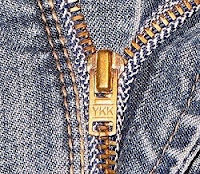 “I don't want you to get a Brazilian,” he tells her, only he calls it a Bolivian. She has to get a Brazilian, every few weeks for a year. “I like you with hair there,” he says, “I like women with hair there,” but his position is a losing climb. “Suit yourself,” he says, “but it's for men who fantasize girls.” “It's cleaner,” she says, thinking of the artist in St. Paul who wouldn't let hair near his mouth. She has told him about the camera but not about the rhinoceros who texts her in Reading: gitting any? like a common pornographer or a crowd.
“I don't want you to get a Brazilian,” he tells her, only he calls it a Bolivian. She has to get a Brazilian, every few weeks for a year. “I like you with hair there,” he says, “I like women with hair there,” but his position is a losing climb. “Suit yourself,” he says, “but it's for men who fantasize girls.” “It's cleaner,” she says, thinking of the artist in St. Paul who wouldn't let hair near his mouth. She has told him about the camera but not about the rhinoceros who texts her in Reading: gitting any? like a common pornographer or a crowd.
Blood everywhere, and this time she hasn't prepared for him or shaved. Fifteen pillow shams at the Palmer House devastated, a serious poet from Philadelphia, not the writer from Reading after all.
The third first he: Had he seen it? The ring. He couldn't move forward to be inside it with her: it was a deadlock in several positions. He went down to look at her, to shell gaze. There was a wedding band. “You said you weren't a virgin when I met you,” he said. “I'm not,” she said. And he returned it.
Labels:
CoE,
CWaN,
draft,
feuilleton,
fiction,
Fictionaut,
flash fiction,
story collection
Tuesday, January 05, 2010
Fiancée
The willing suspension of disbelief, a parakeet.
You cook then leave dishes for the reader.
I prevent having dishes to wash by not cooking.
I eat nuts and cheese and berries, but what if I did not eat?
. . .
A while ago, my boyfriend left me. Bella says it's sexy that I go around my small circle in town saying, “He broke up with me. He left me. He quit.” Sexy, but I don't know how not to: he didn't leave, and he wasn't my boyfriend. He was my fiancé. He stays in, deep in, a granite fissure in Manhattan. I stay in Minnesota and go out. I go out to meet the girls—old girls, new. We go on, trifling with language that's in use for us. Hot, cool, loving women with not cool, loving husbands or with hot, cool, loving boyfriends or with no husband or boyfriend: duende for a season or a reason for a while.
“You don't like the word ‘cunt,'” my fiancé said judiciously. “I like it but not as a first name,” I said.
Bella shows me a heavy, beaded necklace that matches my boots--beige-tipped and turquoise-shafted, the turquoise color not visible under jeans. I bought the jeans already tattered so I wouldn't have to wait for them, but they are all cotton without added stretch, so I wait anyway, stand around cased in them, dropping pounds walking and talking ceaselessly in them, talking and walking, while the air in the rooms turns pale red. He'd spy me dancing to paragraphs, gorging on beer then pizza yet growing loose and looser in the limbs until I feel like a girl again, a go-girl on a budget, a Gidget, a gadget. Yes, I say to Bella: I'll take the beads and black wool wrap with alpaca feathers and peacock brooch starred with crystals. I wind the stole around my jeans and pin the peacock at my hip. The wrap swings like a thick skirt over the jeans and beige boots. The peacock sparkles. They say and it is: subject for a runway.
. . .
Bella tells a story about a woman, an acquaintance, who came into the boutique with her boyfriend, the woman smelling of an STD. We perk up, listen. What STD? The smelly one, Bella says. The one with impossible syllables no one has heard of. The men of the north reject condoms and motorcycle helmets. The law permits you to break your head.
We walk to the Narrows from the boutique, fortified by talk of men and fashion. The Narrows is a blues bar known for outbreaks of small violence. I am wearing the winter white swing coat I bought for the wedding and the gold and turquoise beads.
A crowd parts to assess us. We take our seats at the corner of the bar. At the boutique we drank vodka. If I want to kill myself, but I don't, not here, not now, I'll order red wine. I ask for a Stella. A handsome man is already sitting next to me. I eye him as I shimmy in. He has beady green eyes. We go straight to politics. He is a Republican who lives on the Lake and commutes to Wall Street. Here, I am not surrounded by liberals on a sofa. Liberals are irresponsible dreamers who know nothing about finance, he says. I am not a liberal I tell him, but a leftist, a feministe. I hate abortion -- keep it legal, I say. I am wearing the sapphire ring. I have no friends and no enemies. My fiancé left me, I say.
An hour of this, a radio hour of talk-fucking, his green eyes boring into me, he leaves, and I turn, isolated. “He's married!” I say to Jen. “After I invested an hour in it.” Jen laughs and repeats to Bella what I say. Bella has to leave. It's ten. I move to her seat and into the brown eyes of a bald man shorter than I, a Libertarian distributor of faux tin ceiling panels. He sails in summer, ice boats in winter. I am a leftist and a feministe, I tell him. My fiancé left me. When we get up to dance, I feel drunk, but he holds me at the waist, and my legs kick out freely on the tiles.
. . .
If I get caught drinking and driving, I'll go to jail for a year. I tell the man with the brown eyes to drive us. Where are we going? To his house, he tells me. His friend, also named Tom, gets in the backseat. That Tom wears tiny spectacles, and I think that I have gotten it backward and that the glasses-Tom is the intellectual, but what if none of us is? I put on the seatbelt.
At Tom's the other Tom says good night in the driveway, and we go upstairs to where a clean white dog with beige spots and beautiful brown eyes is watching us. Tom leads me to a black leather couch in one of the living rooms. He strips me: boots, jeans, swing coat, beads. In moments, he's in me. He's not large, not small, slick. This--that--entry--is raison d'etre. “Clean as a whistle,” I say to the air, meaning no organisms, the organisms you can feel on contact. "Tight,” he says.
My fiancé said,“It was like having sex with the Holland Tunnel to be fucking Diana. My wife that was sex in a monkey patch. But sex with you is the sweetest, snuggest space.”
I'm glad Tom rolls me over and buffs me again. I call out in the dark that I'm a Jamaican. Another man comes near the room and stands in the door. He says something, but I miss it. I don't know who the other man is, but I see his shadow watching us. I wish the second man would come in, but there's thought in his distance. Later Tom tells me it's his foster son. Tom is 61.
. . .
I wake in the bed looking out at a giant golden maple, not knowing what town we are in. “What town is this?” I ask Tom, and he tells me but I forget. He answers my next thought, "I can't get you pregnant."
. . .
At breakfast, Kevin, who is 23, tall, dark, and impressive, sees me in the light. “I thought you were African when I heard you,” he says. “British and Swedish,” I tell him. “I might be Arab,” he says.
(Published at Istanbul Literary Review, May edition, 2010.)
You cook then leave dishes for the reader.
I prevent having dishes to wash by not cooking.
I eat nuts and cheese and berries, but what if I did not eat?
. . .
A while ago, my boyfriend left me. Bella says it's sexy that I go around my small circle in town saying, “He broke up with me. He left me. He quit.” Sexy, but I don't know how not to: he didn't leave, and he wasn't my boyfriend. He was my fiancé. He stays in, deep in, a granite fissure in Manhattan. I stay in Minnesota and go out. I go out to meet the girls—old girls, new. We go on, trifling with language that's in use for us. Hot, cool, loving women with not cool, loving husbands or with hot, cool, loving boyfriends or with no husband or boyfriend: duende for a season or a reason for a while.
“You don't like the word ‘cunt,'” my fiancé said judiciously. “I like it but not as a first name,” I said.
Bella shows me a heavy, beaded necklace that matches my boots--beige-tipped and turquoise-shafted, the turquoise color not visible under jeans. I bought the jeans already tattered so I wouldn't have to wait for them, but they are all cotton without added stretch, so I wait anyway, stand around cased in them, dropping pounds walking and talking ceaselessly in them, talking and walking, while the air in the rooms turns pale red. He'd spy me dancing to paragraphs, gorging on beer then pizza yet growing loose and looser in the limbs until I feel like a girl again, a go-girl on a budget, a Gidget, a gadget. Yes, I say to Bella: I'll take the beads and black wool wrap with alpaca feathers and peacock brooch starred with crystals. I wind the stole around my jeans and pin the peacock at my hip. The wrap swings like a thick skirt over the jeans and beige boots. The peacock sparkles. They say and it is: subject for a runway.
. . .
Bella tells a story about a woman, an acquaintance, who came into the boutique with her boyfriend, the woman smelling of an STD. We perk up, listen. What STD? The smelly one, Bella says. The one with impossible syllables no one has heard of. The men of the north reject condoms and motorcycle helmets. The law permits you to break your head.
We walk to the Narrows from the boutique, fortified by talk of men and fashion. The Narrows is a blues bar known for outbreaks of small violence. I am wearing the winter white swing coat I bought for the wedding and the gold and turquoise beads.
A crowd parts to assess us. We take our seats at the corner of the bar. At the boutique we drank vodka. If I want to kill myself, but I don't, not here, not now, I'll order red wine. I ask for a Stella. A handsome man is already sitting next to me. I eye him as I shimmy in. He has beady green eyes. We go straight to politics. He is a Republican who lives on the Lake and commutes to Wall Street. Here, I am not surrounded by liberals on a sofa. Liberals are irresponsible dreamers who know nothing about finance, he says. I am not a liberal I tell him, but a leftist, a feministe. I hate abortion -- keep it legal, I say. I am wearing the sapphire ring. I have no friends and no enemies. My fiancé left me, I say.
An hour of this, a radio hour of talk-fucking, his green eyes boring into me, he leaves, and I turn, isolated. “He's married!” I say to Jen. “After I invested an hour in it.” Jen laughs and repeats to Bella what I say. Bella has to leave. It's ten. I move to her seat and into the brown eyes of a bald man shorter than I, a Libertarian distributor of faux tin ceiling panels. He sails in summer, ice boats in winter. I am a leftist and a feministe, I tell him. My fiancé left me. When we get up to dance, I feel drunk, but he holds me at the waist, and my legs kick out freely on the tiles.
. . .
If I get caught drinking and driving, I'll go to jail for a year. I tell the man with the brown eyes to drive us. Where are we going? To his house, he tells me. His friend, also named Tom, gets in the backseat. That Tom wears tiny spectacles, and I think that I have gotten it backward and that the glasses-Tom is the intellectual, but what if none of us is? I put on the seatbelt.
At Tom's the other Tom says good night in the driveway, and we go upstairs to where a clean white dog with beige spots and beautiful brown eyes is watching us. Tom leads me to a black leather couch in one of the living rooms. He strips me: boots, jeans, swing coat, beads. In moments, he's in me. He's not large, not small, slick. This--that--entry--is raison d'etre. “Clean as a whistle,” I say to the air, meaning no organisms, the organisms you can feel on contact. "Tight,” he says.
My fiancé said,“It was like having sex with the Holland Tunnel to be fucking Diana. My wife that was sex in a monkey patch. But sex with you is the sweetest, snuggest space.”
I'm glad Tom rolls me over and buffs me again. I call out in the dark that I'm a Jamaican. Another man comes near the room and stands in the door. He says something, but I miss it. I don't know who the other man is, but I see his shadow watching us. I wish the second man would come in, but there's thought in his distance. Later Tom tells me it's his foster son. Tom is 61.
. . .
I wake in the bed looking out at a giant golden maple, not knowing what town we are in. “What town is this?” I ask Tom, and he tells me but I forget. He answers my next thought, "I can't get you pregnant."
. . .
At breakfast, Kevin, who is 23, tall, dark, and impressive, sees me in the light. “I thought you were African when I heard you,” he says. “British and Swedish,” I tell him. “I might be Arab,” he says.
(Published at Istanbul Literary Review, May edition, 2010.)
Labels:
CoE,
draft,
Fictionaut,
short story,
story collection
Subscribe to:
Posts (Atom)





